French character actress Lise Delamare (1913-2006) was a sociétaire of the Comédie-Francaise. She first appeared onscreen in 1933 and continued to make films until 1989. She was directed by such famous filmmakers as Jean Renoir, René Clair, and Max Ophüls.

French postcard by Editions P.I., Paris, no. 47. Photo: Star.

French postcard by Editions P.I., Paris, no. 114. Photo: Roger Carlet.
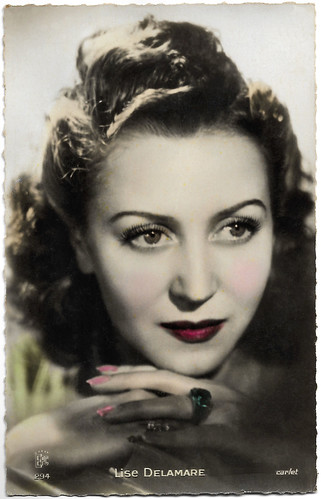
French postcard by EPC (Editions et Publications Cinématographiques), no. 294. Photo: Carlet.
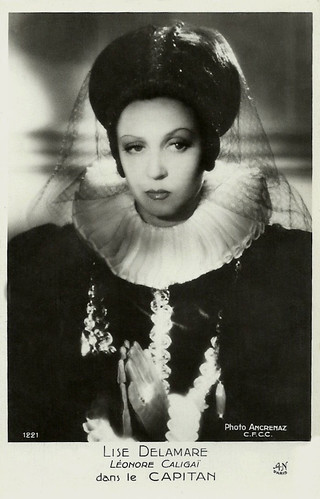
French postcard by A.N., Paris, no. 1221. Photo: Ancrenaz, C.F.C.C. Lise Delmare as Léonore Caligaï/Leonora Galigai, the wife of Concini, in Le Capitan (Robert Vernay, 1946).

French postcard by S.E.R.P., Paris, no. 87. Photo: Studio Harcourt.
Jolyse Effrey Jeanne Delamare was born in Colombes, France in 1913. Her father was the radio pioneer George Delamare, who introduced the spoken journal in France. Her sister, Rosine Delamare, would become a costume designer for stage, TV, and film.
Lise started her acting career in 1933. In January 1934 she began to work at the Comédie-Francaise, where she stayed until 1942. In 1944 she returned and in 1951 she became sociétaire. Her definitive departure from the Comédie-Francaise was in 1966.
In 1933, Delamare also made her film debut in the cross-dressing comedy Georges et Georgette (Reinhold Schünzel, Roger Le Bon, 1933), the alternative language version of the Ufa production Viktor und Viktoria/Victor, Victoria (Reinhold Schünzel, 1933). Her first major film was Pension Mimosas (Jacques Feyder, Marcel Carné, 1934) starring Françoise Rosay.
Three years later she played Queen Marie-Antoinette in La Marseillaise/The Marseillaise (Jean Renoir, 1937), an epic account of the French Revolution. The film juxtaposes the opulent life of King Louis XVI (Pierre Renoir) with the poverty of the commoners who rose up to overthrow the monarchy in 1789. The film's title comes from the rallying song which grew out of the peasants' march on the Bastille. La Symphonie Fantastique/The Fantastic Symphony (Christian-Jacque, 1941) details the life and times of 19th-century composer Hector Berlioz (Jean-Louis Barrault). Delamare played one of the loves of his life.
She then appeared opposite Pierre Richard-Willm in the costume drama Le Comte de Monte-Cristo/The Count of Monte Christo (Robert Vernay, 1943), based on the famous novel by Alexandre Dumas. Director Robert Vernay also asked her for a part in his next costume drama, Le Capitan/The Captain (1946) based on a novel by Michael Zevaco. The film is set during the reign of Louis XIII and concerns a devil-may-care nobleman (Jean Pâqui) who endeavours to foil a plot against the life of the king. When the film was premiered in Paris, audiences were enthralled and did not complain at all about the excessive length of 200 minutes.

French postcard. Caption: Lise Delamare de la Comédie Française.

French postcard by Ed. Chantal, Paris, no. 525. Photo: Films d'Aguiar.
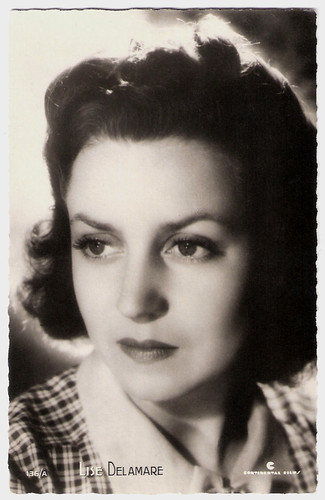
French postcard by Editions Continental, no. 136/A. Photo: Continental Films.
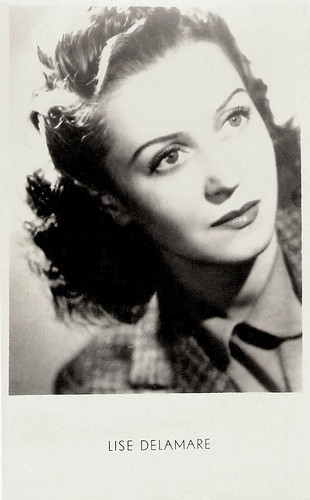
Dutch postcard.
Another highlight was the realistic French biopic Monsieur Vincent (Maurice Cloche, 1947) starring Pierre Fresnay. Delamare was part of a huge cast with Aimé Clariond as Cardinal de Richelieu and Germaine Dermoz as Queen Anne of Austria.
The film traces Saint Vincent De Paul’s progress from his days of forced servitude in Algiers to his entry into the priesthood, culminating with his Herculean efforts on behalf of the ill and destitute in early 17th-century France. The film was made under the most trying of conditions over two years and won France's Grand Prix award in 1947. The following year it was honored with the Oscar for Most Outstanding Foreign Language Film.
Delamare played the mother of Lola (Martine Carol) in Lola Montès (1955), Max Ophüls' final film. Bruce Eder at AllMovie calls it a “cinematic tour-de-force masquerading as a biography, in this case, a dazzling fictionalized life of the notorious 19th-century dancer, actress, and courtesan”. Delamare also played a supporting part in the romantic drama Les Grandes Manoeuvres/Grand Maneuver (René Clair, 1955), starring Michèle Morgan and Gérard Philipe.
From then on she appeared incidentally in films, such as Il suffit d’aimer/Bernadette of Lourdes (Robert Darène, 1960) as a mother superior, the comedy Clerambard (Yves Robert, 1969) featuring Philippe Noiret, Salut l’artiste/Hail the Artist (Yves Robert, 1975) starring Marcello Mastroianni, and the TV film Les Affaires sont les affaires/Business is business (Jean-Paul Carrère, 1984).
In 1967 she became Sociétaire Honoraire of the Comédie-Francaise. She also went to teach at the Conservatoire National Supérieur d'Art Dramatique de Paris. Her last film was the black satire Baxter (Jerome Boivin, 1989), based on the American novel 'Hell Hound'. Lise Delamare died in 2006 in Paris. She was married to actor Tony Taffin. They divorced in 1953.

French postcard by Ed. Chantal, Rueil, no. 25. Photo: C.E.F.C. Lise Delamare in Le Comte de Monte-Cristo/The Count of Monte Christo (Robert Vernay, 1943).

French postcard, no. 33. Photo: Studio Harcourt.

French postcard by S.E.R.P., Paris, no. 191. Photo: Studio Harcourt.
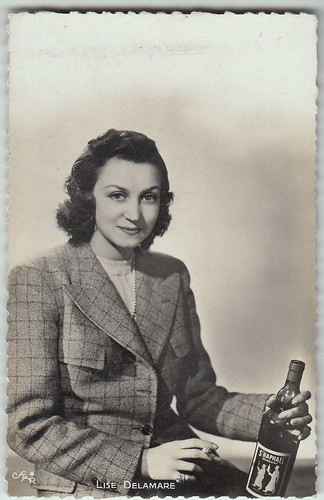
French promotion postcard for St Raphael. Photo: Star. Collection: Marlene Pilaete.
Sources: Hal Erickson (AllMovie), Bruce Eder (AllMovie), AllMovie, Wikipedia (French, English), and IMDb.
This post was last updated on 12 December 2023.

French postcard by Editions P.I., Paris, no. 47. Photo: Star.

French postcard by Editions P.I., Paris, no. 114. Photo: Roger Carlet.

French postcard by EPC (Editions et Publications Cinématographiques), no. 294. Photo: Carlet.

French postcard by A.N., Paris, no. 1221. Photo: Ancrenaz, C.F.C.C. Lise Delmare as Léonore Caligaï/Leonora Galigai, the wife of Concini, in Le Capitan (Robert Vernay, 1946).

French postcard by S.E.R.P., Paris, no. 87. Photo: Studio Harcourt.
Cross-dressing comedy
Jolyse Effrey Jeanne Delamare was born in Colombes, France in 1913. Her father was the radio pioneer George Delamare, who introduced the spoken journal in France. Her sister, Rosine Delamare, would become a costume designer for stage, TV, and film.
Lise started her acting career in 1933. In January 1934 she began to work at the Comédie-Francaise, where she stayed until 1942. In 1944 she returned and in 1951 she became sociétaire. Her definitive departure from the Comédie-Francaise was in 1966.
In 1933, Delamare also made her film debut in the cross-dressing comedy Georges et Georgette (Reinhold Schünzel, Roger Le Bon, 1933), the alternative language version of the Ufa production Viktor und Viktoria/Victor, Victoria (Reinhold Schünzel, 1933). Her first major film was Pension Mimosas (Jacques Feyder, Marcel Carné, 1934) starring Françoise Rosay.
Three years later she played Queen Marie-Antoinette in La Marseillaise/The Marseillaise (Jean Renoir, 1937), an epic account of the French Revolution. The film juxtaposes the opulent life of King Louis XVI (Pierre Renoir) with the poverty of the commoners who rose up to overthrow the monarchy in 1789. The film's title comes from the rallying song which grew out of the peasants' march on the Bastille. La Symphonie Fantastique/The Fantastic Symphony (Christian-Jacque, 1941) details the life and times of 19th-century composer Hector Berlioz (Jean-Louis Barrault). Delamare played one of the loves of his life.
She then appeared opposite Pierre Richard-Willm in the costume drama Le Comte de Monte-Cristo/The Count of Monte Christo (Robert Vernay, 1943), based on the famous novel by Alexandre Dumas. Director Robert Vernay also asked her for a part in his next costume drama, Le Capitan/The Captain (1946) based on a novel by Michael Zevaco. The film is set during the reign of Louis XIII and concerns a devil-may-care nobleman (Jean Pâqui) who endeavours to foil a plot against the life of the king. When the film was premiered in Paris, audiences were enthralled and did not complain at all about the excessive length of 200 minutes.

French postcard. Caption: Lise Delamare de la Comédie Française.

French postcard by Ed. Chantal, Paris, no. 525. Photo: Films d'Aguiar.

French postcard by Editions Continental, no. 136/A. Photo: Continental Films.

Dutch postcard.
Cinematic tour-de-force
Another highlight was the realistic French biopic Monsieur Vincent (Maurice Cloche, 1947) starring Pierre Fresnay. Delamare was part of a huge cast with Aimé Clariond as Cardinal de Richelieu and Germaine Dermoz as Queen Anne of Austria.
The film traces Saint Vincent De Paul’s progress from his days of forced servitude in Algiers to his entry into the priesthood, culminating with his Herculean efforts on behalf of the ill and destitute in early 17th-century France. The film was made under the most trying of conditions over two years and won France's Grand Prix award in 1947. The following year it was honored with the Oscar for Most Outstanding Foreign Language Film.
Delamare played the mother of Lola (Martine Carol) in Lola Montès (1955), Max Ophüls' final film. Bruce Eder at AllMovie calls it a “cinematic tour-de-force masquerading as a biography, in this case, a dazzling fictionalized life of the notorious 19th-century dancer, actress, and courtesan”. Delamare also played a supporting part in the romantic drama Les Grandes Manoeuvres/Grand Maneuver (René Clair, 1955), starring Michèle Morgan and Gérard Philipe.
From then on she appeared incidentally in films, such as Il suffit d’aimer/Bernadette of Lourdes (Robert Darène, 1960) as a mother superior, the comedy Clerambard (Yves Robert, 1969) featuring Philippe Noiret, Salut l’artiste/Hail the Artist (Yves Robert, 1975) starring Marcello Mastroianni, and the TV film Les Affaires sont les affaires/Business is business (Jean-Paul Carrère, 1984).
In 1967 she became Sociétaire Honoraire of the Comédie-Francaise. She also went to teach at the Conservatoire National Supérieur d'Art Dramatique de Paris. Her last film was the black satire Baxter (Jerome Boivin, 1989), based on the American novel 'Hell Hound'. Lise Delamare died in 2006 in Paris. She was married to actor Tony Taffin. They divorced in 1953.

French postcard by Ed. Chantal, Rueil, no. 25. Photo: C.E.F.C. Lise Delamare in Le Comte de Monte-Cristo/The Count of Monte Christo (Robert Vernay, 1943).

French postcard, no. 33. Photo: Studio Harcourt.

French postcard by S.E.R.P., Paris, no. 191. Photo: Studio Harcourt.

French promotion postcard for St Raphael. Photo: Star. Collection: Marlene Pilaete.
Sources: Hal Erickson (AllMovie), Bruce Eder (AllMovie), AllMovie, Wikipedia (French, English), and IMDb.
This post was last updated on 12 December 2023.
No comments:
Post a Comment